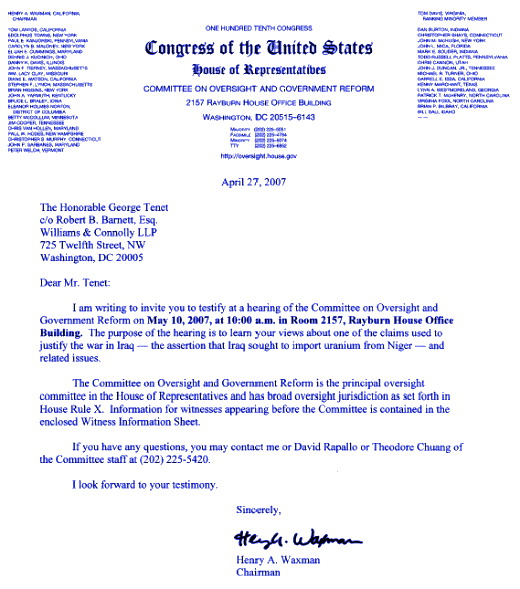Posted on Monday 30 April 2007
Time present and time past
Are both perhaps present in time future,
And time future contained in time past.
If all time is eternally present
All time is unredeemable.
What might have been is an abstraction
Remaining a perpetual possibility
Only in a world of speculation.Burnt Norton, T.S. Eliot
I wrote below that I would like to know the truth about Iraq at all costs, and would like for us to create an environment that will optimize its emergence – even if it means letting people off the hook for going along with the madness that got us into the war. I’ve been thinking a lot about why I said that, and if I really believe it. Tenet was supposed to be an Intelligence Officer, not a politician. It’s clear that he did not stick to his job description. He said yesterday that he never heard the Administration seriously discuss whether or not going to war with Iraq was a good idea. He only heard them talk about how to do it. I believe him. That’s consistent with what Paul Oniell said, what Richard Clarks said, what the neocons in the Project for a New American Century wrote. But it’s not what the Intelligence said. And Tenet’s job was Intelligence.
My first medical training program was in Internal Medicine under a truly remarkable Chairman. He taught us that the most important thing about being a physician is knowing when you didn’t know something. He used to say, "When you present a case, tell me what you don’t know. Don’t show off and tell me what you do know. How else will I know what to teach you?" And he taught a corollary, the highest virtue is to know when you’re wrong and admit it – "You can’t learn from mistakes if you don’t admit that you made them." That second part is the hardest. Every physician who has been in the trenches has made mistakes, sometimes fatal mistakes. Those things haunt us all, but better to be haunted and learn, than to be in denial and make the same mistake again. Human beings are not good at being fallible.
 I’ve always thought that one of the great figures of our times was John Dean. Somehow, when the Watergate Affair became a big deal, he found it in himself to wake up and tell the truth. As I recall, he did not tell the story in a self protective way when he testified. He told it straight, including his part. That’s a truly remarkable thing to have done. Tenet was trying to admit his errors, but he couldn’t quite bring it off. He was too defensive, too much the victim, made too many excuses. If he’d only said "I got caught up in the politics, and lost sight of my responsibility. I’m ashamed of that. I suppose I can look back and see why it happened, but that doesn’t let me off the hook." But he didn’t say that.
I’ve always thought that one of the great figures of our times was John Dean. Somehow, when the Watergate Affair became a big deal, he found it in himself to wake up and tell the truth. As I recall, he did not tell the story in a self protective way when he testified. He told it straight, including his part. That’s a truly remarkable thing to have done. Tenet was trying to admit his errors, but he couldn’t quite bring it off. He was too defensive, too much the victim, made too many excuses. If he’d only said "I got caught up in the politics, and lost sight of my responsibility. I’m ashamed of that. I suppose I can look back and see why it happened, but that doesn’t let me off the hook." But he didn’t say that.
But as much as I want the people who were complicit with this debacle to heed the words of my old Chairman, it’s not happening. Self justification is part of the human psyche, a big part. I often marvel that humility and a willingness to be wrong is one of the most desirable traits in "others." We are drawn to people who exhibit such qualities. Yet it is one of the most difficult traits to develop in one’s self. Seems like it ought to be easier.
We’re sure not going to get that kind of thing from George W. Bush, Dick Cheney, Condaleeza Rice, or Karl Rove – ever. We’ve all witnessed Alberto Gonzales saying "I take full responsibility" and "I didn’t do anything wrong." He’s fond of the passive voice too – "mistakes were made." I don’t guess we’re going to hear "I was wrong" from the Attorney General either.
Frankly, I hope we do finally run across some John Deans – people who are introspective enough to break free of their frame of reference and ‘get it’ that something terrible has happened here, and they’ve been a part of it. But barring that, I’ll settle for people simply telling the truth – even if it’s filled with self-justifying excuses and disavowals of responsibility, because we badly need for everyone to see how all of this has been played out. It’s time future I’m thinking about. It’s the voter who supported Bush, particularly the second time, that I’m thinking about. If that voter doesn’t have the information available to look inside at why he/she overlooked the obvious, they will vote the same way again. I don’t mind conservative, but I do mind irresponsible ideological voting when the ideological candidate is incompetent and malevolent. The only thing I can think of that might change that is confrontation with the truth, no matter what it takes to get it on the table…






 George’s concern over being scapegoated is touching. But could he not have seen it coming? Not even when Rumsfeld asked him in the fall of 2002 (that is, before the war) whether he had put in a system to track how good the intelligence was compared with what would be found in Iraq? The guys I know from Queens usually can tell when they’re being set up. Maybe Tenet was naive enough to believe that the president, whom he describes as a "kindred soul," would protect him from thugs like Vice President Cheney and then-Defense Secretary Rumsfeld, even when – as was inevitable – someone had to take the fall. Or did he perhaps actually believe the Cheney dictum that US forces would be greeted as liberators?
George’s concern over being scapegoated is touching. But could he not have seen it coming? Not even when Rumsfeld asked him in the fall of 2002 (that is, before the war) whether he had put in a system to track how good the intelligence was compared with what would be found in Iraq? The guys I know from Queens usually can tell when they’re being set up. Maybe Tenet was naive enough to believe that the president, whom he describes as a "kindred soul," would protect him from thugs like Vice President Cheney and then-Defense Secretary Rumsfeld, even when – as was inevitable – someone had to take the fall. Or did he perhaps actually believe the Cheney dictum that US forces would be greeted as liberators?  Marcy Wheeler, A.K.A. emptywheel, is a Comparative Literature Ph.D. turned political sleuth. In Comparative Literature, "careful reading" of texts is the thing to do, and she’s turned those skills on the political intrigues of our times – notably the Plame Affair. Now she’s focused on the U.S. Attorney firings and the voluminous texts available as DOJ email "dumps." Right now, she’s in the middle of sleuthing out The Perplexing Case of Margaret Chiara.
Marcy Wheeler, A.K.A. emptywheel, is a Comparative Literature Ph.D. turned political sleuth. In Comparative Literature, "careful reading" of texts is the thing to do, and she’s turned those skills on the political intrigues of our times – notably the Plame Affair. Now she’s focused on the U.S. Attorney firings and the voluminous texts available as DOJ email "dumps." Right now, she’s in the middle of sleuthing out The Perplexing Case of Margaret Chiara. Margaret Chiara [WD-MI] was one of the fired U.S. Attorneys. She was on the firing list from the start, though it’s not exactly apparent why. She wasn’t after any big Republicans. She wasn’t resisting the Bush DOJ Agendae. And from reading her emails, she actually comes across as a nice, sensible person. Why would such a person be fired?
Margaret Chiara [WD-MI] was one of the fired U.S. Attorneys. She was on the firing list from the start, though it’s not exactly apparent why. She wasn’t after any big Republicans. She wasn’t resisting the Bush DOJ Agendae. And from reading her emails, she actually comes across as a nice, sensible person. Why would such a person be fired?
